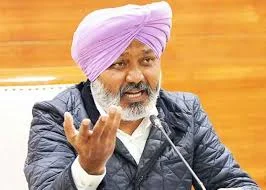Chandigarh | June 15 – Political parties across Punjab have voiced strong opposition to the Centre’s proposed “one nation, one election” framework, calling it an assault on India’s federal and constitutional structure.
Punjab Finance Minister Harpal Singh Cheema, representing the Aam Aadmi Party (AAP), termed the proposal “a direct attack on the spirit of the Constitution” during a meeting convened by the Joint Parliamentary Committee (JPC) chaired by BJP MP PP Choudhary.
“The proposed Bill is nothing but a hidden agenda to erode the autonomy of states. It will allow the Centre to dictate the tenure of state assemblies,” Cheema said after the meeting, where he was joined by AAP state president Aman Arora in rejecting the idea. “This opens the door for rampant misuse of Articles 356 and 360, giving the Centre sweeping powers to dissolve or suspend elected governments.”
Under the proposed amendments, the Election Commission would have the authority to advise the President to delay Assembly elections if simultaneous polls with the Lok Sabha are deemed unfeasible — a clause that Cheema warned would give the Centre disproportionate influence over state affairs. “It’s a backdoor attempt to centralise power and will boomerang on the BJP,” he said.
Echoing these concerns, Punjab Congress chief Amrinder Singh Raja Warring said the scheme violates the foundational principle of federalism. “State and national elections are fought on different issues. Forcing both together amounts to diluting the voice of regional India,” Warring said. “This is nothing short of creeping authoritarianism in the name of electoral efficiency.”
The Shiromani Akali Dal (SAD) also criticised the proposal, calling for the repeal of Article 356, which allows the Centre to dismiss state governments — a move they argued has historically disrupted the electoral process. The party further opposed the inclusion of Article 82-A Clause-5, which grants the Election Commission discretion to defer Assembly elections.
“This provision could be weaponised against Opposition parties,” an SAD representative told the JPC. “Without addressing such core issues, simultaneous elections cannot be fair or free.”
With opposition cutting across party lines in Punjab, the proposal for synchronized elections faces stiff resistance in a state where the idea is seen not as reform but as regression.

